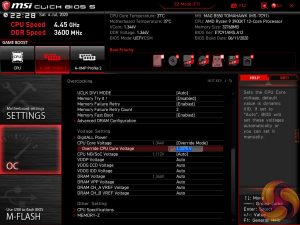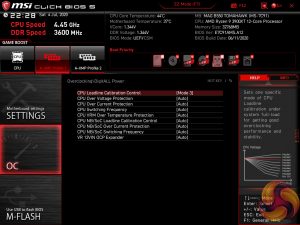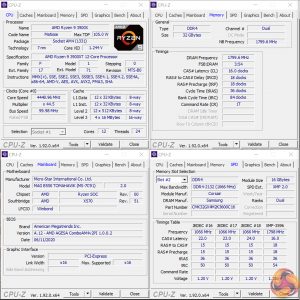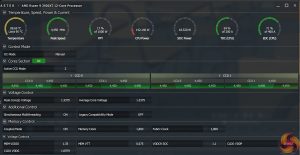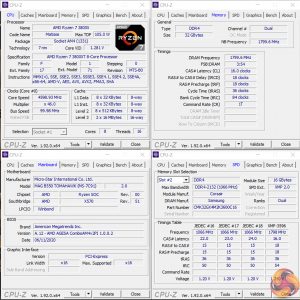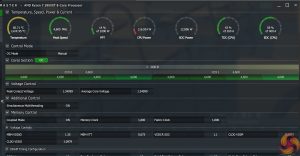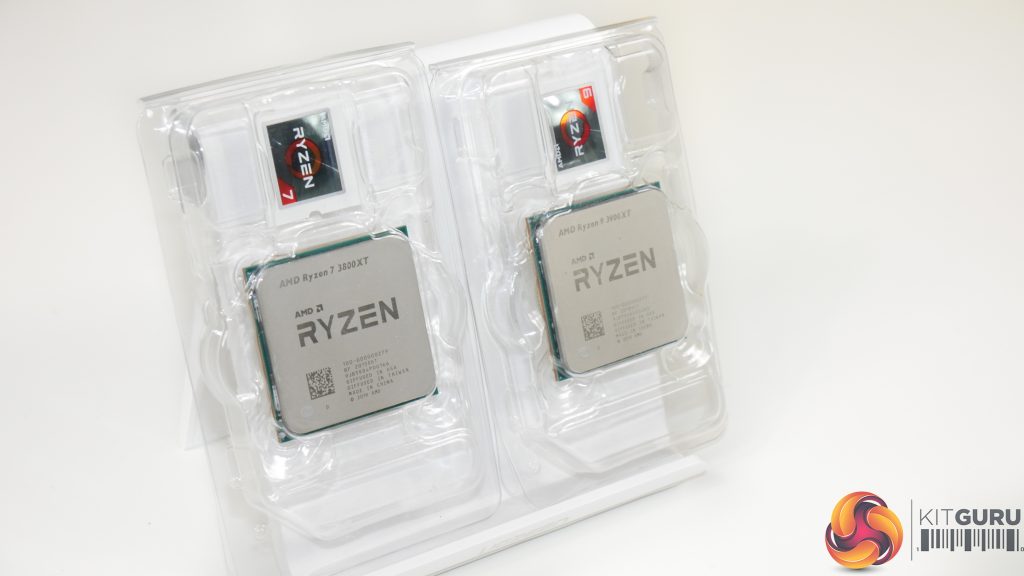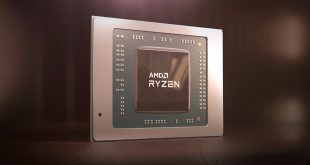Frequency, especially in all-core scenarios, is still the area where people find issue with Ryzen 3000X and Zen 2. Intel still manages to push significantly higher clock speeds from its Skylake-based chips on the heavily refined 14nm process technology. That’s especially true when looking at all-core operating frequencies versus Zen 2 in power unlimited scenarios.
As such, we were hoping to see these new, optimised XT chips operate at higher all-core frequencies when overclocked. We were pleased by the results!
Ryzen 9 3900XT Manual Overclocking:
Our Ryzen 9 3900XT sample managed 4.45GHz all-core frequency using 1.3375V and Mode 3 LLC on our MSI B550 Tomahawk motherboard. Yes, that’s a perfectly capable board from an overclocking standpoint, before any complaints are made.
(ignore the “Ryzen 9 3900X” naming – CPU-Z has yet to be updated for the accurate naming)
4.45GHz on all 12 cores using a 280mm AIO liquid cooler is a good result for Zen 2 in our opinion. This is around 150-200MHz higher than we could typically expect from the Ryzen 9 3900X based on our own experience and reading user feedback.
Temperatures were high, especially when loading the system using AIDA64. But during Blender and Cinebench runs, our 280mm AIO kept the CPU in check and below 95°C.
We increased the voltage as high as 1.375V to try to push up to 4.5GHz, but this was not achievable on our CPU through a combination of system crashing at the clock speed or CPU overheating using our 280mm AIO.
We settled for 4.45GHz and tuned the voltage down to a reasonable 1.3375V, which was typically 1.325V under load.
Ryzen 7 3800XT Manual Overclocking:
(ignore the “Ryzen 7 3800X” naming – CPU-Z has yet to be updated for the accurate naming)
Our Ryzen 7 3800XT sample managed 4.6GHz all-core frequency using 1.375V, which was typically around 1.36-1.375V under load.
Temperatures and voltage were as high as we were happy with at this point, so we could not push the frequency any further. We were actually able to reduce the voltage to 1.35V and run all of our tests, with the exception of Blender and Handbrake H264 conversion.
This is around 200-300MHz higher than what we typically see from a Zen 2 8-core 3000X chip such as the Ryzen 7 3800X. An improvement of up to around 300MHz from AMD/TSMC’s process optimisations is an impressive improvement for the 3800XT, in our opinion.
Manual Overclocking Outcome:
The manual overclocks we settled for throughout testing were 4.45GHz at 1.3375V for the Ryzen 9 3900XT and 4.6GHz at 1.375V for the Ryzen 7 3800XT.
We were very happy to see notable improvements in the achievable overclocks for both of the XT chips. The improvements were also more important than the simple frequency uplift as they represent a change in the thought process for Zen 2 overclocking.
Previously, a user who could push their 3900X or 3800X to around 4.25-4.4GHz would have to decide whether they were happy to accept the reduction in maximum boost clock speed in order to gain higher multi-threaded operating frequencies from the overclock. It was a compromise – high all-core clocks and reduced boost clocks from manual overclocking OR high boost clocks and reduced all-core clocks from Precision Boost 2/Overdrive.
With the Ryzen 7 3800XT in particular, that is no longer the scenario. Based on our result, a user could happily overclock their chip to 4.6GHz all-core knowing that their drop in single-threaded boost clocks is minimal but their uplift in all-core performance is significant. The logic is similar for the 3900XT but less so, given the lower frequency we achieved.
This is an important change brought about by the XT chips with their improved frequency capability. And it is a more positive outcome than a simple 150-300MHz increase in overclocking results with our samples would suggest.
Be sure to check out our sponsors store EKWB here
 KitGuru KitGuru.net – Tech News | Hardware News | Hardware Reviews | IOS | Mobile | Gaming | Graphics Cards
KitGuru KitGuru.net – Tech News | Hardware News | Hardware Reviews | IOS | Mobile | Gaming | Graphics Cards


